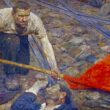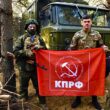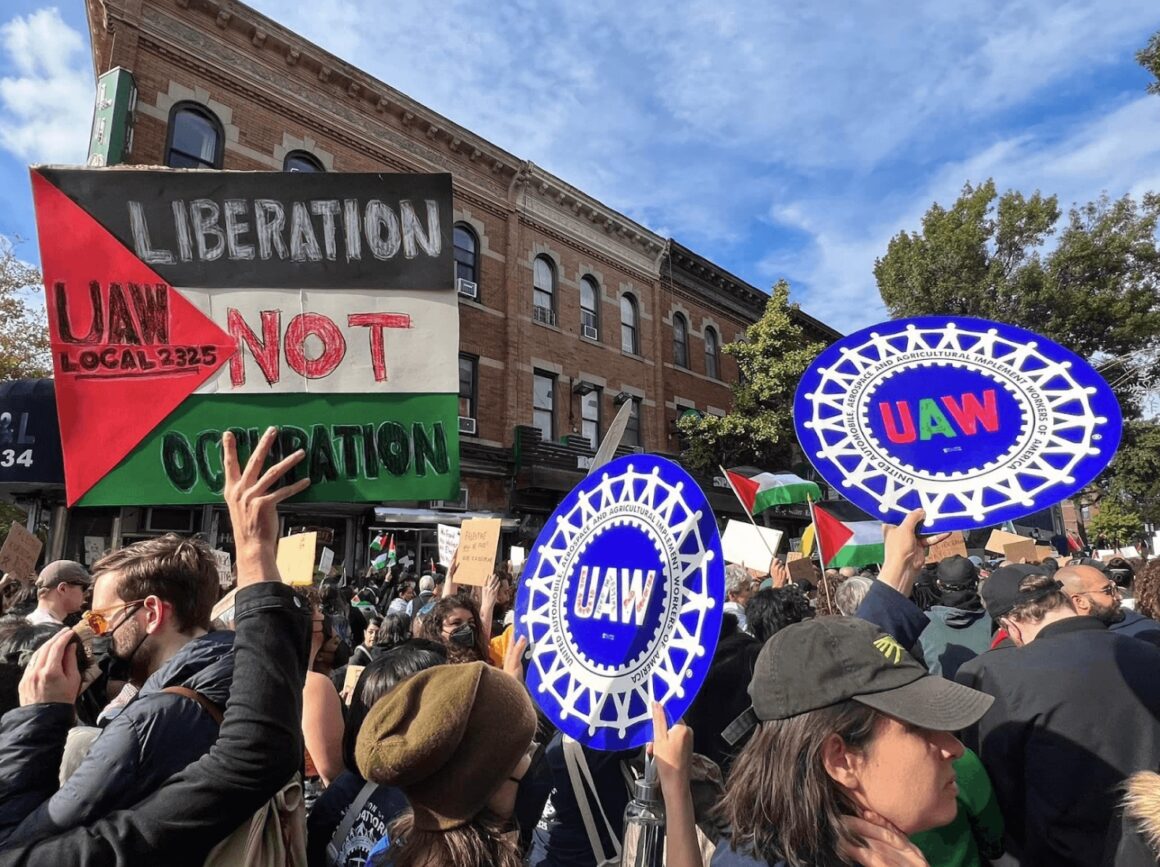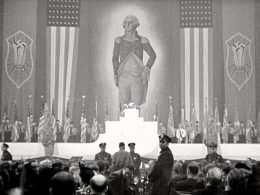The Gaza genocide is making more workers in the empire’s core aware of a fundamental reality: that countering U.S. foreign policy is at this stage of central importance. If we in the core underrate the need for resisting imperialist wars, we both condemn so many of our fellow human beings to death and suffering; and sabotage our own struggle against capitalist exploitation. We cannot let the imperialism-compatible opportunists within the workers movement do what the Second International did, and make possible the advancement of capital’s war plans. And with the intensification of Zionism’s war on Palestine to the point of a new Nakba, growing amounts of U.S. workers are recognizing this need to combat pro-imperialist opportunism by the labor leaders.
Such a trend is apparent in how many members of the United Auto Workers have confronted their organization’s leadership, calling for an end to the old practices of acting complacent in Zionism and aligning with the Democratic Party. Equivalent grievances can be applied to the labor bureaucracy, and to much of the established “left,” when it comes to every other facet of U.S. imperialism. Just as the opportunists within the labor movement have failed on opposing the Gaza genocide, they’ve failed on opposing NATO’s Ukraine proxy war, the hybrid war against China, the ongoing war upon Syria, and the military buildup against socialist Korea. Certain orgs among these, like the PSL, have taken correct stances on certain parts of these issues; like how the PSL has repudiated the narratives of Chinese “imperialism.” This “support” for China is contradicted, though, by the org’s opposition to Russia’s military action against fascism and imperialism.
That’s the lesson which the Marxists who are serious about anti-imperialism need to communicate towards these pro-Palestine workers: every front of the struggle against U.S. hegemony is inseparably connected. Therefore if you demand a principled mode of operating from your labor leaders on Palestine, you need to be demanding the same consistency on opposing the new cold war.
The Donbass peoples, who’ve been subjected to shelling by Ukraine’s fascist U.S. coup regime in retaliation for exercising their self-determination, deserve solidarity as much as the victims of Zionist colonization do. And beyond that moral component, it’s simply a strategic reality of our class struggle that the core’s capitalist dictatorship can only be defeated by an effective anti-imperialist movement. By a movement that works to combat everything the empire does to maintain its imperial hegemony, from massacring crowds of starving Palestinians to unleashing Nazi death squads against Russian speakers.
This is the indispensable value that an anti-imperialist united front has to the labor movement: it can free worker organizing from the constraints of “leftism,” which keep the class struggle unable to build a true mass base. Leftism does this by keeping organizers confined to a niche space, one that perpetuates its own isolation by viewing the bulk of the people as not worth reaching. The only elements of the people that “leftism” views as acceptable to work with are other leftists or liberals, and even then only the ones who don’t come towards taboo positions like supporting Russia.
If we want to harness the growing revolutionary potential of our society’s people, or break our government’s power to define the foreign policy narrative, we have to expand the class struggle into a broad ideological front. Which means marrying the workers rights projects of the union laborers, with the project of our antiwar coalition to disrupt the foreign policy discourse.
The frustrations that these UAW workers have directed towards their leaders on Palestine shows there’s a growing mass mandate for such a merger to be made. The workers are yearning for leaders and organizing partners who can be trusted not to forsake international anti-imperialist solidarity. And because the labor bureaucrats and main “socialist” leaders have an incentive to remain opportunists, the only option these disillusioned workers have is to join with the forces that are committed to anti-imperialism.
This doesn’t mean they should leave their unions. As Lenin concluded, revolutionaries absolutely should work in even reactionary trade unions, so the more anti-imperialists we have in these unions the better. Lenin’s argument in favor of that position gives hope for achieving proletarian victory amid the liberal domination of our labor leadership. Because Lenin clarified that whatever reactionary aspects the unions have, we have no choice but to go through them:
The development of the proletariat did not, and could not, proceed anywhere in the world otherwise than through the trade unions, through reciprocal action between them and the party of the working class. The proletariat’s conquest of political power is a gigantic step forward for the proletariat as a class, and the Party must more than ever and in a new way, not only in the old, educate and guide the trade unions, at the same time bearing in mind that they are and will long remain an indispensable “school of communism” and a preparatory school that trains proletarians to exercise their dictatorship, an indispensable organisation of the workers for the gradual transfer of the management of the whole economic life of the country to the working class (and not to the separate trades), and later to all the working people…It would be egregious folly to fear this “reactionism” or to try to evade or leap over it, for it would mean fearing that function of the proletarian vanguard which consists in training, educating, enlightening and drawing into the new life the most backward strata and masses of the working class and the peasantry.
What does this tell us about how to proceed? For those of us who are already involved in the pro-Russian orgs which exist outside “leftism,” such as CPI and PCUSA, it means we need to build connections between ourselves and our local unions. For the majority of the people who are reading this, though, and who are involved in the broader class struggle, one’s likely role in this effort is different. It’s not necessarily becoming part of these orgs, and establishing those ties between them and the unions. Unless you feel seriously compelled to do that, which would of course be good, what you can instead do is make it harder for the opportunists to isolate the anti-imperialists. As in nurture a culture within labor organizing which isn’t susceptible to the sectarian divisions that opportunist orgs, such as PSL, seek to make normal within the broader workers movement.
You can join a communist org if you like, but most of the people who contribute to a given revolution aren’t members of the revolutionary cadres themselves. The masses are the ones who carry out a revolution, not simply the most organized minority. That’s why it’s the responsibility of we in this minority to reach and aid the people, not the other way around. This is what led Lenin to the conclusion that the Bolsheviks should work in the established unions, as that’s where crucial parts of the masses can be found. We can’t reasonably expect every one of these union workers to become part of our orgs, and that’s not necessary for our success. What’s both doable and necessary, though, is to inoculate the labor organizing spaces against left sectarianism. Against the ideas, put forth by PSL and other orgs in its vein, which say that the class struggle needs to exclude everyone besides left-liberals.
The PSL/ANSWER leaders attacked the pro-Russian orgs last year, and then sabotaged the Hands off Uhuru movement to maintain their own organizing monopoly. Now, as the class struggle intensifies, they seek to recruit labor organizers into this crusade against anti-imperialist forces which challenge them. As people like those disillusioned UAW workers get more engaged with anti-imperialist politics, the opportunists in the activism side of organizing hope to alienate them from CPI, PCUSA, and their partners in mass-centered practice. They want to expand the amount of politically involved left-wing actors who think that anyone challenging liberal tailism is a “red-brown” reactionary infiltrator. Which would be a grievous blow against the struggle, as it would mean the workers who’ve been seeking to combat their opportunistic labor leaders will simply join the project of another wing of opportunists.
The goal of both the activist and labor opportunist leaders is to prevent the workers which share anti-imperialist values from uniting. The saboteurs in the activist element want to divide these workers either by convincing them that it’s “fascist” to support Russia, that it’s “fascist” to expand the struggle beyond the left, or both. Which is an extension of the more directly Democrat-aligned worldview promoted by the labor bureaucrats, wherein the workers are told to uncritically support the Democratic Party and its foreign policies. The PSL leadership wants to sell the workers an alternative to this where their support for Palestine is validated, but it’s not okay to support Russia, nor to try to reach beyond the “leftist” bubble. We offer them an alternative which won’t hold back their development in these ways.
————————————————————————
If you appreciate my work, I hope you become a one-time or regular donor to my Patreon account. Like most of us, I’m feeling the economic pressures amid late-stage capitalism, and I need money to keep fighting for a new system that works for all of us. Go to my Patreon here.
To keep this platform effective amid the censorship against dissenting voices, join my Telegram channel.








